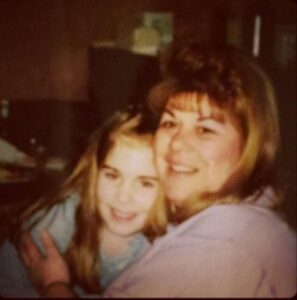Posts Tagged ‘coping’
Creating Mother’s Day Traditions as a member of the Dead Mom Club
About a week after Easter this year, I noticed I was starting to feel off. My sleep wasn’t as restful, experiencing tension in my body, at times I was getting irritated with the simplest things. Then while streaming an episode of television, 4 ads back to back all talking about Mother’s Day. Then came the promotional emails, the store displays, and even a banner at the top of my Microsoft Word app directing users to their Mother’s Day templates.
Each year, my relationship with Mother’s Day has changed and it will likely continue to transform for the rest of my life. Early in my grief, I avoided any reminders. It was so difficult to work my part-time job in high school with Mother’s Day displays all around me, hearing about patrons’ plans, and then being asked how my own family would celebrate. I would feel my grief weigh heavily on my body, wanting to sleep until June 1st if I could. My first few Mother’s Days were about survival mode, and getting through my waves of grief.

Photo of Jessica and her mother, facing the camera and smiling.
I’m not crushed by my Mother’s Day grief these days in the same way, but I know it is a time of year for me when my grief can show up more. Thoughts about what she would think about streaming platforms; the things I want to tell her; the things I want to thank her for. As my grief has changed these past 18 years, I’ve written letters to my mom, worn pieces of her jewelry, visited her gravesite, bought and written a Mother’s Day card she would have liked, and made some of my favourite childhood recipes of hers.
I would spend many of my Mother’s Days with my grandmother, my mom’s mom as I knew that day held its difficulties for her too. As my grandmother’s health declined over the pandemic, I wasn’t always able or allowed to visit with restrictions. After she died in 2021, I was in a fog by the time Mother’s Day 2022 came around. It felt surreal to me, that on my mother’s side – there are no longer any living maternal presences in my life.

Photo of Jessica wearing a blue satin dress and her mother wearing a long black and
white floral jacket , holding hands as if they are dancing for the camera.
Last year, a friend and another member of the Dead Mom Club were talking about how much this time of year can impact us. These conversations led to something surprising, and beautiful, but also a new tradition that I look forward to engaging in this year. Last Mother’s Day, we had dinner at a nice restaurant downtown, dressed up, and spent an evening talking about our moms. I wore a skirt that belonged to my grandmother and some jewelry that belonged to my mom. My friend also shared items they were wearing or keeping with them that reminded them of their mom. We laughed, we cried, we hugged. It was so cathartic to talk about the things some of our other friends couldn’t quite understand. At times dreading that 2nd Sunday in May, I now know that I can hold space for the difficult emotions that may arise and that I can also look forward to it. To look forward to having dinner with a dear friend, to holding space for the joy, love, and grief we have for our moms, to feel a little less alone on a day that can feel isolating as the rest of the world celebrates it.
_____________________________________________________________________________________________
By Jessica Milette, MSW, RSW . Grief Stories Healthcare Consultant
Jessica is a registered social worker and owner and of Cultivating Connections. Her expertise includes helping individuals and families facing anticipatory grief, ambiguous loss, disenfranchised losses, and sudden deaths. Jessica believes in the power of connection; within ourselves, with those who have died, those we are in relationship with, and with our greater communities. Through sharing our stories of grief and loss, we tend to our connection with those who have died and creating connections with others.
Jessica is a white woman living on the traditional territory of the Anishnabek, the Haudenosaunee, the Attiwonderonk, and the Mississaugas of the Credit peoples, also known as Guelph, ON.
Craig – My Cumulative Grief
Craig – My Cumulative Grief
Craig shares his story of experiencing a series of significant losses over the course of two years. He talks about the shock, grief, and uncertainty he felt during this time, and how he coped with the accumulation of loss.Craig’s story is a reminder that grief is a normal and natural response to loss, but it can be overwhelming when it comes in waves. If you are experiencing grief, it is important to reach out for support from friends, family, or a therapist. There is no right or wrong way to grieve, and everyone experiences it differently. The important thing is to be patient with yourself and to allow yourself to feel your emotions.
Craig – How men process grief
Craig – How men process grief
Craig talks about his personal story of grief and how he learned to process his emotions in a healthy way. He discusses the challenges that men face when grieving, and offers advice on how to find healthy ways to cope with loss.Craig lost his wife, his mother, his job, and his home in a short period of time. He describes how he felt pressured to be stoic and strong for others, and how this made it difficult for him to grieve. He eventually realized that it was important to allow himself to feel his emotions, even the difficult ones.Craig shares some of the things that helped him to process his grief, such as talking to a therapist, writing in a journal, and spending time in nature. He also emphasizes the importance of finding support from friends and family. This video is a powerful and moving story of how one man found healing after experiencing a series of devastating losses. It is an important reminder that grief is a normal and healthy emotion, and that there are healthy ways to cope with it.
Jim – Significant incidents
Jim – Significant incidents
Jim discusses being involved in a significant incident and how it’s normal to feel overwhelmed and ruminate over it. You may even start to drink or use drugs to cope. But it’s important to remember that you’re not alone. Many police officers have been through similar experiences. And there are resources available to help you get through this. One of the best things you can do is talk to a trusted friend or colleague. They can offer support and understanding. You can also seek professional help from a therapist or counselor. They can help you to process your experience and develop healthy coping mechanisms. It’s also important to remember that you can’t change the past. But you can learn from it. And you can move on. Don’t let one incident define you. You are a strong and capable person. And you will get through this.
Antoinetta – Things that help when struggling
Antoinetta – Things that help when struggling
Antoinetta talks about the first time she learned that it was ok that she was grieving and how to unpack all her feelings
Adam – Things that are OK to do
Adam – Things that are OK to do
Adam talks about things he does to cope with grief like singing and crying
Adam – Story 2
Adam – Story 2
Adam discusses his busy life and how he has coped after losing his mother
Learning from Grief
By Noelle Bailey
Grief is weird. Odd start, I know, but that was the sentence I used a lot whenever someone asked me how I was. It was never a constant feeling; it changed day to day. And still does. It’s the full gambit of emotions from sadness to anger to guilt and, though dark, even humour found its way in.
In December of 2019, I lost my father. His health had been declining for several months, and we had started the process to diagnose and begin treatment for what we knew was probably cancer. At his first appointment with his oncologist, he was immediately admitted to the ER. By the next day he was on a ventilator, and within twelve days they came to tell me that the cancer had spread everywhere. We had lost a fight we hadn’t even really begun. In March of 2022, my mother passed away after a 14 year fight with MS. It was a much different process to lose her by degrees over those 14 years, witnessing her own body turn against her while powerless to do anything to stop it.
Those are my two experiences with the strangeness of grief. They were vastly different experiences, but also similar in that they cut me in two and changed my life.
The two biggest things I’ve taken from my grieving process are these:
1. I will, for the rest of my life, miss the conversations we will never have. There are books I’ve read since they left that I would love to talk to my mom about. My dad never got to hear about my new job, and he would have loved it. Pictures people have brought me that I can never ask them about, stories I missed out on hearing. The moments of my life, big and small, that they won’t be here for is the part that takes me under every time.
2. I can grieve however I need to. It doesn’t need to look a certain way or be anything other than what I need. I struggled a lot after losing my mom with the idea that I wasn’t sad enough or broken enough because after watching her long hard battle there was a certain peace lacing itself through the pain. When we laid my parents to rest in the cemetery next to my grandparents, we played “The Rainbow Connection” sung by Kermit the Frog because that’s what my mom had always said she wanted to play to say goodbye. Then my husband, Cale, and I did a shot of Jack, like my dad and Cale did when they went out for my dad’s 60th.
I’ve never been very good at setting boundaries in my life, but I tried very hard to make sure I set them surrounding my grief. To let myself do whatever I needed to process the loss of my parents and not to let anyone tell me I should be acting or feeling a certain way. I laughed at things they would have laughed at, and when I needed to, I cried. I am slowly learning how to live in a world without my parents, and know that I will be for the rest of my life.
Katie – Coping strategies
Katie – Coping strategies
Katie explains her coping strategies
Birthdays, Anniversaries, and Other Special Days
Rachel Herrington – Social Service Worker Graduate, Third Year Psychology Student, Equal Rights and Community Advocate
It has been 10 years since my grandmother passed away and it never fails, every year leading up to her birthday I spend weeks with a pit of sadness and remorse in my stomach. I spend my days feeling this way and not understanding why then something makes the date catch my eye and it hits – It’s her birthday.
When we are grieving, some days are more difficult than others. Grief comes in waves like the sea and can feel like an intertwining labyrinth of emotions. Birthdays, anniversaries, and special dates that are associated with our loved one who has died can contribute to more emotionally intense days which can be worsened through the anticipation and “what ifs” of the upcoming day. These difficult days can leave us feeling defeated and it can almost feel like we’ve taken two steps backward in our grieving process, but grief does not have a timeline, and these feelings of setbacks are opportunities for healing.
Before the Day:
Communicate and set boundaries with others – think about how you want to approach the day and share your wants, needs, and desires with others. Clearly communicating your wants and needs with others will allow the opportunity for you to set the expectation for the day which can help relieve the intense feelings of anticipation.
Remember there is no right or wrong way to celebrate special days – It is important to remember that there is no right or wrong way to grieve and there is no written code or rule on how these special days are to be approached. However you decide to approach the day is the right way.
On the Day:
Allow yourself the opportunity for space from others – it is important to allow there to be an opportunity for you to step away and have a safe space to feel your emotions if you need to. If you are attending someone else’s home for the occasion plan a way that you can step away or leave with ease if you need to.
Find something that grounds you when intense emotions arise – if intense emotions are arising it can be helpful to find something to help ground you in the moment. This could be a physical item such as a small trinket in your pocket that you can hold, squeeze, and focus on in your hand, or it can be through positive mental imagery, deep breathing, and/or stress relieving acupressure, etc.
Take deep breaths – practicing deep breathing can help reduce stress and can increase resiliency during highly emotional or stressful situations.
If things don’t go as planned, that is okay – grief is a process with no timelines or set of rules, and sometimes things do not always go the way we plan and that is okay. Allow yourself time, patience, and understanding while you adapt to living with your unique grief experience.
What I know about grief
Post by Alyssa Warmland, artist, activist, well-practiced griever.
I earned my “grief card” at 15, when I lost my mother. Since then, I’ve experienced other instances of loss and have become a well-practiced griever. Most recently, I lost a friend in a tragic way. She was deeply connected within our rural Ontario community and as I grieve her loss, I’m watching many other people around me grieve. Some, like me, are experienced in grief. Others are newer to the experience.
The following are some things I know to be true about grief for me, based on my lived experience. Some of them may resonate with you as well. Grief is unique to the people experiencing it in each moment, so please take whatever makes sense to you from this share and leave whatever doesn’t.
– Give yourself space to just feel the waves. Sometimes it feels like it’s not quite so intense, and then sometimes it feels like you’ve just been punched in the stomach. And it’ll cycle around. And it won’t feel this way forever.
– You’re totally allowed to feel whatever it is you’re feeling. Last night, while I spoke with sobbing friends on the phone, I was absolutely furious. Today, it’s that gut-punch feeling. it’ll cycle around. And it won’t be this way forever.
– Sharing stories can be helpful. Celebrate the reasons you loved whoever you’re grieving. Look at the pictures. Watch the videos. Sing the songs.
– Be patient with yourself, but keep going through the motions of what you know you need to do to maintain your wellness while you grieve. Eat something, even if you’re not hungry. Sleep or lay down, even if you feel like you’ll never fall asleep (podcasts can help make it less overwhelming). Drink water. Go for a walk outside. Write about it. Work, if you want to work (and plan for some extensions on stuff if you can, so you can work a bit more slowly than usual if you need to)
– Your brain may take a little longer to process things. Your memory may not work as well. You may feel irritable or overwhelmed. It’s okay.
– If the death part itself was hard, try to avoid focusing on the end, and instead think about the person you loved and who they were when they were well.
– Connect with other people who are grieving, it may be easier to know you’re not alone.
To learn more about collective grief, please read Maureen’s post on the topic.
Helping Others Help You Through Grief
Post by Maureen Pollard, MSW, RSW
When you’ve experienced the death of a loved one, one of the most difficult things you will go through is trying to find out what helps you adjust to the loss. This can be compounded when others around you don’t understand what you’re going through, and don’t know how to help you. Although you may not have much energy, and you may be reluctant to become a teacher, it may be just what your family and friends need to help you through your grief.
The concept of “pocket phrases” can be quite useful in helping others learn what you need as you grieve. These are statements that you practice ahead of time so that they come to you effortlessly in the moments when you are upset but still need to ask for someone’s help or understanding.
“That’s not helpful.” Usually, our friends and family are trying to help, however their actions may have the opposite effect. With practice, you can develop the ability to say this in a calm, confident voice that halts comments or behaviour that you find hurtful.
“Grief isn’t easy, but it is necessary.” Well-meaning people sometimes want us to move through grief quickly when that is just not possible. You can remind them that it’s normal to feel a full range of feelings after a loss and you don’t need to ‘cheer up’.
“I’m adapting. It takes time to adjust.” When someone in your circle of acquaintances asks how you’re doing, you can use this phrase to remind them that grief is a process. You can ask them directly to have patience with your intense feelings, the changes in your routines and at the same time let them know you’ll never be quite the same again.
“I’m not strong. I’m just doing what I must.” This phrase can be helpful when people praise your ability to function in routine tasks and situations. You may want them to understand that although you may look well on the outside, there’s still a whirlwind of emotion and distress raging unpredictably inside you.
“I like it when you say their name and we talk about them.” You can let people know they don’t have to be afraid to mention your loved one. If you want to share stories, and hear stories from others, you may need to give permission with a clear, direct statement such as this so that people aren’t afraid they will hurt you more by talking about them.
These sample statements can be a good starting point for developing your own useful “pocket phrases” to help teach the people in your life how to help you as you grieve. Remember that the more you practice the things you wish you could say, the easier it will become to pull them out in a peaceful and positive way when needed.





